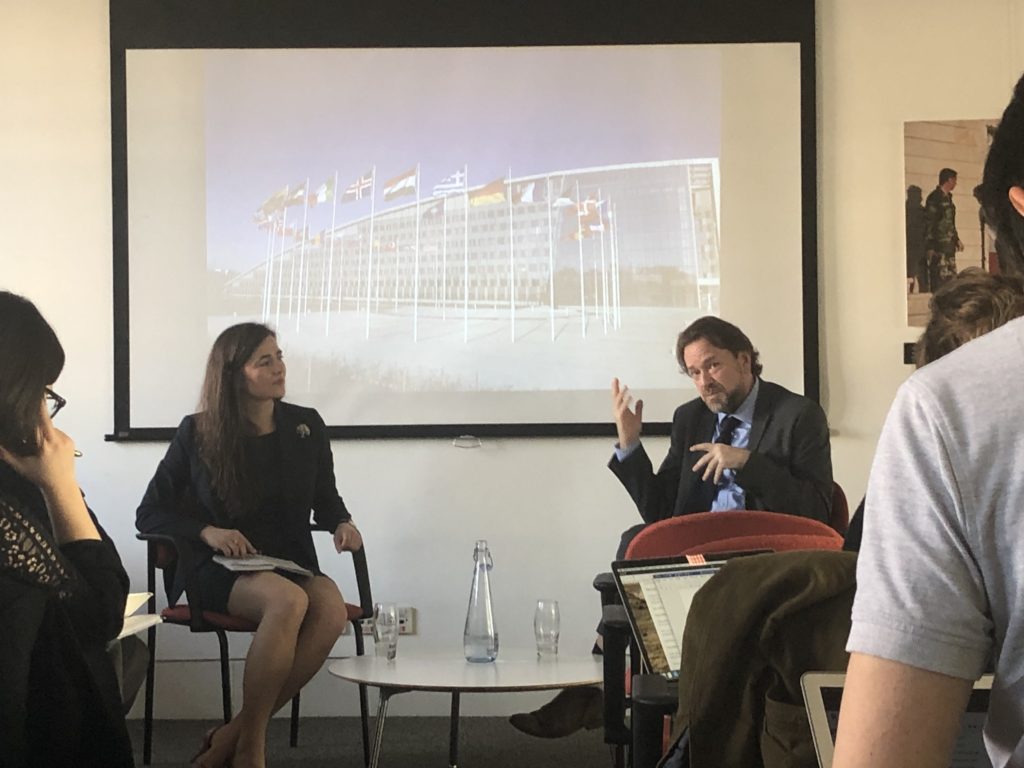by Hélène Kirkkesseli

On 11 March 2020, Strife had the pleasure of welcoming Paul King, Programme Officer/Editor at NATO’s Public Diplomacy Division, to discuss the Alliance’s history, as well as its current agenda. The event, which was well attended by MA and PhD students, was chaired by Strife Senior Editor Stanislava Mladenova, currently a PhD Candidate at the Department of War Studies and former member of the NATO international staff.
Just months after NATO’s seventieth anniversary, this event served as an opportunity to discuss the evolving security threats the Alliance must face. It looked at how, seventy years after its founding, NATO has learned to adapt to emerging challenges, beyond the physical and visible threats outlined in its Article 5, by tackling hybrid warfare and countering international terrorism through shared intelligence. The need to adapt to this new reality was clearly demonstrated by the 2007 cyberattack against Estonia, or the international terrorist attacks in the Alliance’s own capitals. These threats have to lead to NATO improving its awareness, preparedness, and response capabilities through, for example, the standing up in 2017 of the Joint Intelligence and Security Division in its Headquarters.
In terms of the Alliance’s enlargement, King highlighted the Alliance welcoming its thirtieth, and newest member – Northern Macedonia. NATO’s ‘open door policy’ under the Washington Treaty welcomes any country willing and able to meet accession requirements. NATO’s many partners have played an integral part in NATO’s political agenda, and its military missions. But this continued strength, and physical expansion, especially in the last three decades, have sometimes been perceived as threats, especially by Russia, with which the Alliance had cultivated a crucial relationship. This abruptly ended with Russia’s annexation of Crimea in 2014 – an act, which violated international law, as it changed borders by force.
Among the several questions from the audience and particularly one about China’s defence expansion, King reiterated what NATO Secretary-General expressed in December of 2019, that ‘There’s no way that NATO will move into the South China Sea, but we have to address the fact that China is coming closer to us, investing heavily in infrastructure.” King emphasised that NATO is a collective defensive alliance, and it has no interest in a conflict with China, which is undoubtedly a significant player in the world
This event reaffirmed that despite some criticism of the Alliance, and questioning its strength in the current global security climate, NATO’s agenda for the 21st Century is busier than ever. It is continuing to strengthen its ability to deal with old threats, most recently exhibited by more countries reaching 2% GDP of defence spending, but also evolving to meet the challenges of cyber, terrorism, and the shifting geopolitical military strength of China.
Hélène is currently pursuing an MA in International Peace and Security within the War Studies department of King’s College London. Prior to this, she graduated from the double Law degree program between the universities of Paris-Nanterre in France and Essex in the UK, specializing in international public law and EU law. Having previously interned at the DG for External policies of the European Parliament and the US Embassy to France, she is now focusing her studies particularly on the South Caucasus region. You can follow her on Twitter: @hkirkkesseli
Hélène Kirkkesseli
Hélène is currently pursuing an MA in International Peace and Security within the War Studies department of King’s College London. Prior to this, she graduated from the double Law degree program between the universities of Paris-Nanterre in France and Essex in the UK, specializing in international public law and EU law. Having previously interned at the DG for External policies of the European Parliament and the US Embassy to France, she is now focusing her studies particularly on the South Caucasus region. You can follow her on Twitter: @hkirkkesseli